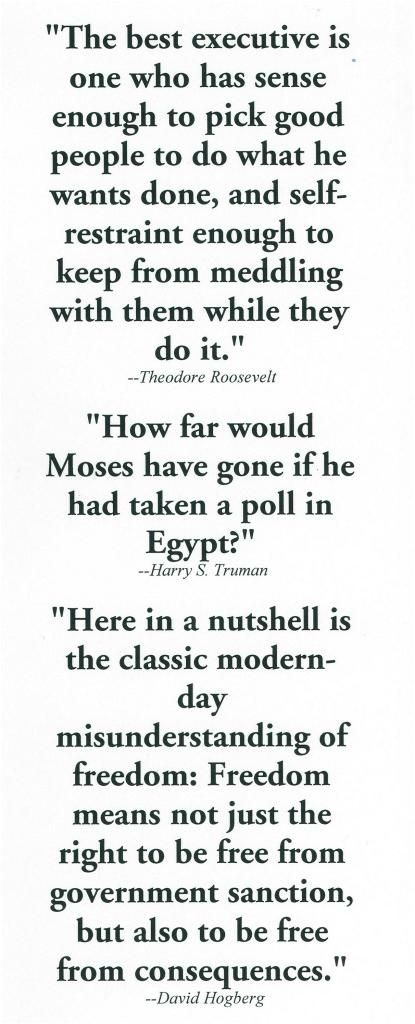Thank You, Mr. Griffin...

Back in the days of corporate life, my cube walls became a place to post ideas and quotations to share. After I had moved up a bit, that place was the glass window in the door to my office. Usually the quotations focused on leadership, responsibility, or the occasional philosophical idea. You see, I have pondered the meaning of life, ethics, and logic. That happens when you take a year's worth of philosophy classes.
I am a college retread. During my first trip through college in the late 1970s, I focused on journalism and took some business and history along the way. My second trip, in the mid 1980s, focused on business and industry. One was the whimsical journey, the other the practical trip. Both trips I paid for mostly out of my own pocket while working full-time.
For the whimsical journey, I took as many classes as I could afford. If there was a class that I could not afford, but still wanted to take, I would sneak into the back of the room and attend. I was kind of auditing the course—no grade but no expense. That is the way I took some of my philosophy classes. I did not turn in tests or papers, but I took the tests and wrote the papers. One day the professor walked up to me before the end of class and asked me to stay to have a conversation. He noted that I was not on the roll and that I had never turned in any of the assignments.
Why? Why was I in the class?
I wanted to learn.
But why was I not on the roll?
Because I had never registered for the class. I could not afford the credit hours, but I still wanted the knowledge.
The professor started to call me Mr. Griffin, the title character of the H.G. Wells novel, "The Invisible Man." I was there, but not in the eyes of the university. I continued to attend the classes I could not afford, and as I could afford them, I would register. For those, I was Mr. Schneider.
The class the professor confronted me in was the ethics class. There I was - getting free education in a "for pay" environment. He could have kicked me out of the class, but he did not. I asked him at the end of the last class why he did not kick me out.
"Everyone else was there to get a grade, to make points to graduation. You were there simply to learn. It would have been unethical to banish you, for you were there for the one true reason, to learn."
---
Quotations come to me from the ether. I used to read them and file them away—a habit formed by reading way too much. I would remember them and pull them out in conversation. I still do. Sometimes the quotations are serious, and sometimes they are just apropos lines I remember from TV ads.
I got into the habit of posting quotations in my first corporate setting in the mid- 1980s. I would put them up at eye level on the inside wall next to the cube opening, where people could see them. Most would not comment, but a few would. I didn't care whether they commented, only that the quotation made them stop and go "hmmmm."
Sometimes I would set up different quotations on the same page: a juxtaposition of thoughts on a single topic.
---
I miss that practice. In today's virtual world, so many people—including me—work so hard to say their own pithy things. In reality, there are almost no original thoughts anymore. Critical thinking is poorly practiced. The quotations remind me that I think about the same things others think about. That keeps me humble.
So, I share the old quotations with you, not when I have nothing to say, but at those times when someone else has said what I want to say, and I just cannot say it any better. You may see them sprinkled into an article, or on a mini-poster like the one above—just like I used to post on my cubical wall or office door.


